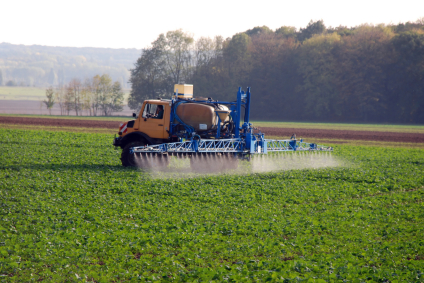Pesticide contamination of organic crops ruled 'trespass' by US courts
Adam Smith Science and Communications Officer, ANH-Intl
KEY POINTS
- Organic farmers in the United States of America have often suffered because of pesticides from nearby non-organic farms contaminating their crops
- Two recent legal rulings in the US set a precedent that organic farmers can sue the contaminating farms for trespass
- Nearly 300,000 organic farmers are currently suing Monsanto over genetic contamination of their crops
After many years of having the legal odds stacked against them in favour of the companies making genetically modified organisms (GMOs) and the farmers who grow them, organic farmers in the USA recently won two landmark cases. Both rulings set a precedent that organic farmers can sue neighbouring farmers if pesticides drift across and contaminate the organic crops. Pesticides, of course, are central to the GMO issue, with Monsanto's Roundup Ready seed – engineered for resistance to the company's pesticide Roundup – the most famous example.
Renowned US constitutional law attorney Jonathan Emord, who acts as legal advisory to ANH-USA, had this to say about the new rulings: "I have long argued that organic farmers should use the law of trespass to sue neighbouring GMO farms when GMO agricultural practices contaminate organic fields. Although in a best-case scenario GMO crops would be banned as not provably safe, the next-best scenario involves protecting organic crops from GMO contamination, and that requires more aggressive litigation by organic farmers to protect the integrity of their crops."
GMOs backed by legal rulings
These new rulings fly in the face of past court decisions. Notoriously, prior rulings have decreed that non-GMO farmers whose crops are contaminated with GMO pollen or seed are guilty of stealing the seed and infringing the seed manufacturer's patents – even though the farmer did not pay for the seed, did not want it on his land, did not know what to do with it and would be unable to sell it! The most famous of these cases was between Monsanto and Canadian canola farmer Percy Schmeiser, and the US Center for Food Safety has put together a report detailing Monsanto's legal battles with farmers over its products.
And that's only the legal cases associated with a single company!
Redressing the balance
There have been some encouraging signs lately that official attitudes may be changing regarding the benefits of GMOs, and of the wisdom of allowing such a new, untested technology into the food chain – at least in the European Union (EU). These two US court judgements appear to continue this trend by affirming the rights of organic farmers to continue their business untainted by users of pesticides.
First, in December 2010, judges in the California Court of Appeal upheld a previous jury decision that found Western Farm Service guilty of "negligence, trespass and nuisance" against Jacobs Farm/Del Cabo, confirming the original award of $1 million damages. Jacobs Farm/Del Cabo's business consists of organically grown crops, including herbs such as rosemary, dill and coriander. In 2006, Western applied organophosphate (OP) pesticides to Brussels sprouts grown on neighbouring farms. Even though Western applied the pesticides in a manner that avoided contamination of nearby fields during the process, the forces of nature later took over and spread droplets of OPs that had dispersed into the air, or 'volatilised', onto Jacobs/Del Cabo crops. This immediately made some of them unsaleable, since the US Environmental Protection Agency (EPA) sets no maximum allowable limit for OPs on herbs like rosemary and dill.
During the original trial, Western argued that they were only responsible for avoiding pesticide drift during the application, and could not be held liable for anything that happened afterward. They were supported in this reasoning by the commissioner's office, which initially found that Western had complied with all relevant facets of pesticides law. This was, in fact, the main reason for the original lawsuit, according to Jacobs/Del Cabo: to change the law to make pesticide users responsible for contamination of neighbouring crops by post-application spread of evaporated droplets.
The lawsuit was successful. According to the trial report, "The jury found, by a vote of nine to three, that [Western] was negligent, had trespassed, had created a nuisance, and that its conduct was a substantial factor in causing harm to [Jacobs/Del Cabo]...The jury awarded plaintiff zero for its 2006 crop loss and $1 million for the 2007 crop loss."
Does a trickle herald a flood?
A judgement from the Minnesota Court of Appeals on 25th July 2011 clearly used the Californian case as a precedent in the case of Oluf and Debra Johnson vs. Paynesville Farmers Union Cooperative Oil Company. The court overturned a previous decision that dismissed the Johnsons' claim for negligence, trespass and nuisance on the part of the oil company for, once again, spraying nearby fields with pesticides that contaminated the Johnsons' organic crops.
The Johnsons' original claim followed several instances of pesticide contamination of their crops by the Cooperative. This must have been very frustrating for the Johnsons, as the incidents occurred while their land was undergoing the transition process from conventional to organic. On several occasions, the family was forced to destroy crops and take fields out of organic production. However, the district court found entirely in favour of the Cooperative, even overturning a temporary injunction preventing the Cooperative from spraying within a quarter of a mile of the Johnsons' farm. The appeals court reversed the decision, finding that the district court had been mistaken on almost every count.
Now, at last, it appears that organic farmers have some robust legal precedents upon which to base claims against conventional and GMO-based farms that contaminate their crops. On 30th March 2011, 270,000 organic farmers brought the case of Organic Seed Growers & Trade Association, et al. v. Monsanto, which alleges contamination of organic crops by GMO genetic material. It will be interesting to see whether the precedents set by the pesticide contamination rulings will have any bearing on this vital case.
Say NO to GM campaign
Return to Homepage








Comments
your voice counts
19 November 2011 at 5:13 am
The sheer fact that monsanto has corrupted the food chain should bring about lawsutes.
Also the fact that the seeds patented by monsanto and listed as pesticides should give rise to the question:, Are these pesticides safe for consumption by both humans and animals?
Food that makes it's own pesticide is dangerous, and can cause a variety of health issues, and food that does harm when consumed, is not food!
Thus it can cause an injury to anyone who consumes it, and that is an intentional harm to both humans & animals.
This clearly shows willfull intent to cause harm, and shows recklessness, because they know that the food is producing harmfull pesticides even after it is harvested but, still try to pass GMO's as food when they are clearly listed in their own patents as a "PESTICIED".
Your voice counts
We welcome your comments and are very interested in your point of view, but we ask that you keep them relevant to the article, that they be civil and without commercial links. All comments are moderated prior to being published. We reserve the right to edit or not publish comments that we consider abusive or offensive.
There is extra content here from a third party provider. You will be unable to see this content unless you agree to allow Content Cookies. Cookie Preferences